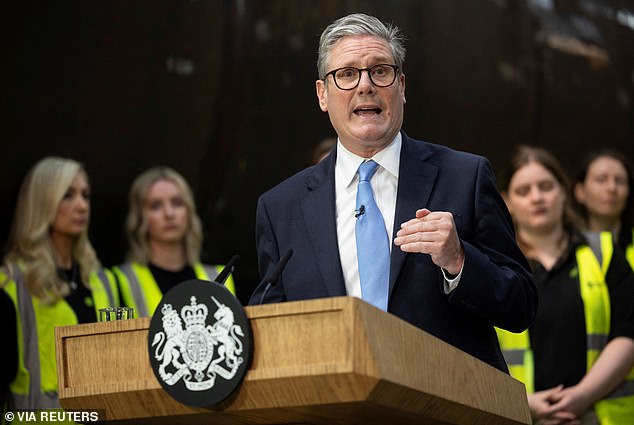Keir Starmer has a touching faith in the idea that by giving his new non-governmental body a grand name – Great British Energy (GBE) – his ambitions for a carbon-free, energy-secure nation will be fulfilled in one fell swoop.
The whole country would, of course, welcome a green and pleasant land with cleaner air, lower carbon emissions, cheaper fuel bills and less dependence on Vladimir Putin and his gas pipelines from Russia to the West.
But the truth is that the Prime Minister and his Energy Secretary, the Green fanatic and failed Labour leader Ed Miliband, are living in a fantasy world. They will deliver few, if any, of the bold promises they are making.
Let me explain. In the King’s Speech, Sir Keir’s new government confirmed that GBE, the state-owned energy company, will develop, own and operate energy projects such as wind farms, using public money to help stimulate greater private sector investment.
Keir Starmer delivers a speech during a visit to Hutchinson Engineering on July 25 (pictured). The Prime Minister hopes Great British Energy will develop projects and reduce prices for the public.
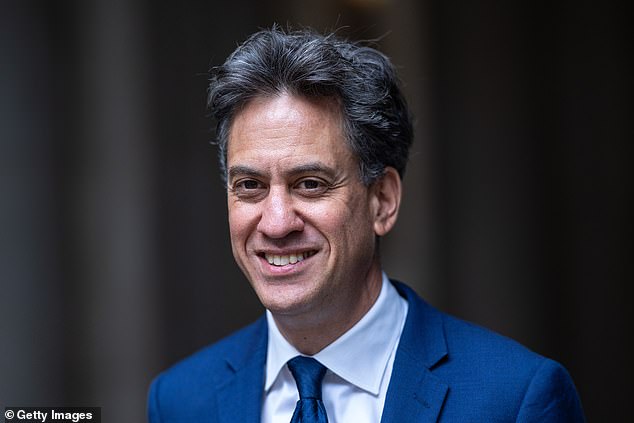
Ed Miliband (pictured July 23) has taken up the role of Energy Secretary, pledging to turn Britain into a clean energy “superpower” by 2030 with locally produced clean energy.
But the £8.3bn of seed money pledged by the Exchequer for Britain’s energy transformation during the current parliament’s term will be a drop in the ocean.
Despite the exaggerated language, this is a fraction of the sums already dedicated to “climate reduction” targets by our UK-listed oil companies, Shell and BP, as well as by nationally owned energy providers Centrica and Scottish & Southern Electricity (SSE).
Some say it is reassuring that GBE is headed by the former head of the British subsidiary of German multinational Siemens, Juergen Maier, who could bring some much-needed private sector experience to the role.
What is less reassuring, however, is the disastrous financial performance of Siemens Energy, which racked up losses of £3.7bn in 2023 alone.
Combined with the desperate record of previous Labour governments in commanding and controlling the economy through grandiose non-governmental organisations such as the National Enterprise Board of the 1970s, it seems almost inevitable that GBE will become another huge black hole, sucking up public money at the expense of other overstretched public services.
Most seriously, by blocking future oil licences in the North Sea, as Starmer has done, and by suspending for the time being the prospects for new nuclear production, the country’s energy security is being sacrificed in favour of pursuing unproven green energy “solutions”.
In doing so, Starmer and Miliband are exposing the nation to the danger of factories closing, the elderly and poor being left cold in their homes and the lights going out when the wind does not blow and the sun does not shine.
It is also critical that the UK is able to maintain a minimum level of electricity production at all times, especially if the Government pursues a headlong rush into electric vehicles (EVs) which, in many cases, are proving notoriously unreliable.
That’s why Centrica-owned British Gas is investing heavily in renewing the country’s gas storage capacity at Rough, off the east coast of Yorkshire, and is exploring other potential sites in Wales.

King Charles (pictured July 11 in Cardiff) is also set to receive a major boost to his income from Great British Energy’s deal with the Crown Estate.
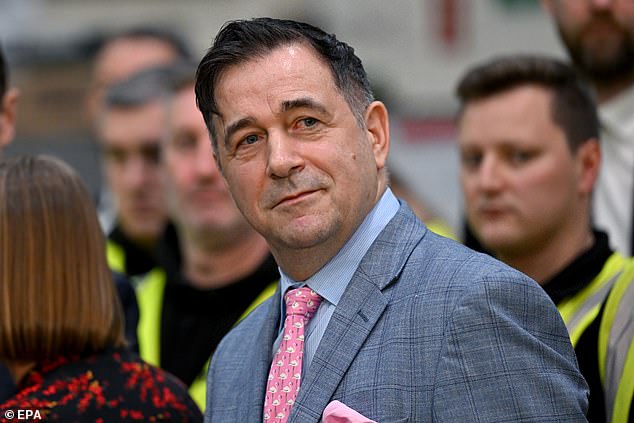
Some say it is reassuring that GBE is headed by the former head of the British subsidiary of German multinational Siemens, Juergen Maier (pictured on 25 July, while Sir Keir gives a speech).
Not to mention that Starmer and Miliband look set to destroy 100,000 North Sea oil jobs, sabotage Aberdeen and lose £30bn of new investment in fossil fuels and the engineering services that go with them, in order to push forward the “green revolution”.
Labour believes that by signing a deal yesterday with the Crown Estate – which has control over most of the country’s coastal waters – it can somehow secure £60bn of new investment.
It is true that this will be useful. Indeed, the link to the monarchy alone might attract some foreign investors on the grounds that it offers a kind of royal endorsement. But we should not get carried away by Labour’s hype.
The Crown Estate has far more experience in redeveloping real estate, such as the shops on London’s fashionable Regent Street, than in energy.
Perhaps not all of Miliband’s green tricks are as revolutionary as he would have us believe. Before his new deal with Labour, for example, the Crown Estate was already in talks with Scandinavian pioneers and Danish experts in marine energy.
And despite the Crown Estate’s prestigious reputation, the fact is that the only thing that will attract investors is a competitive entry price. If the price at which energy generated from offshore wind farms can be sold is too low to make the projects viable, bidders will be discouraged.
We learned this the hard way in a crucial auction late last year, when no company submitted a bid to operate a new offshore wind farm. Why? Because the Conservative government had set the price of energy too low. Even more seriously, a major proposed investment off the coast of Norfolk was temporarily put on hold.
The same thing happened in the US last year, when Ørsted cancelled £3.3bn worth of wind projects because it could not achieve the necessary returns.
Earlier this year, BP also pulled out of its stake in New York state wind farms (at great cost to investors) because of the difficulty in obtaining decent returns.
The ultimate aim of all these wind farms may have been to secure lower prices for consumers. The reality is that only by offering a higher price to investors will the projects be brought forward and built. It is an inconvenient truth for Starmer and Miliband, who want to be seen as providing the cheapest possible energy to voters.
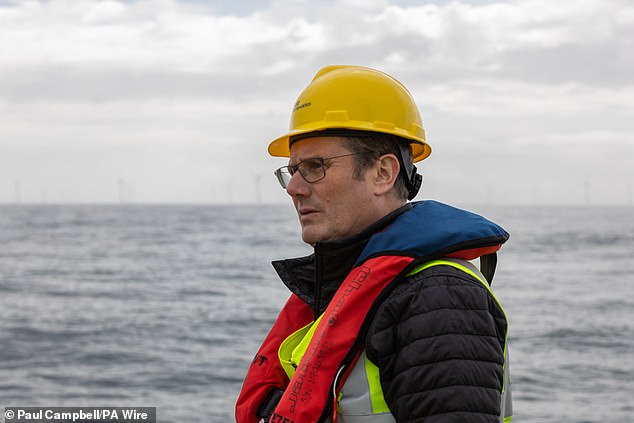
Sir Starmer visited the Beatrice wind farm off the coast of Caithness last year
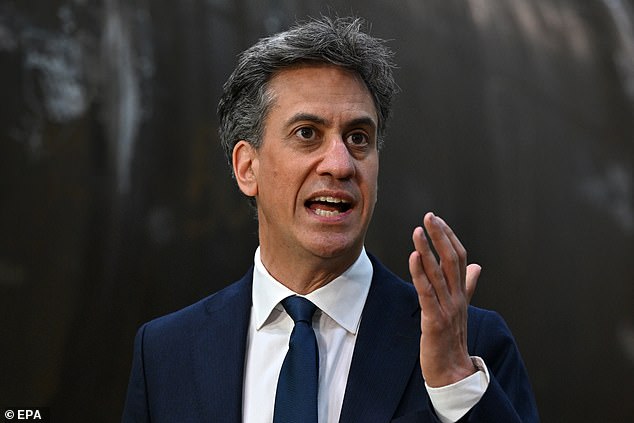
Ed Miliband spoke ahead of Sir Keir Starmer during his visit to Hutchinson Engineering in Widnes yesterday
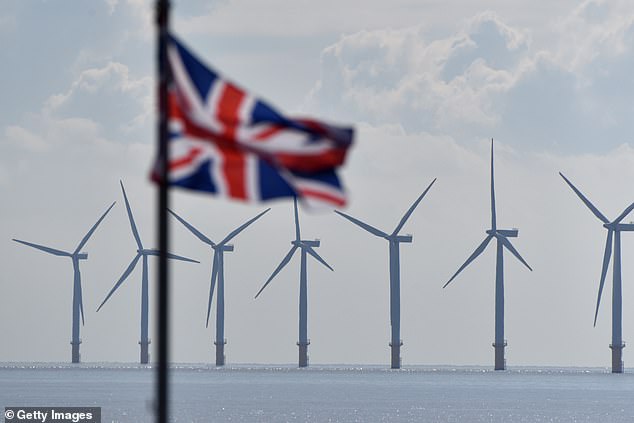
Gunfleet Sands offshore wind farm with the British flag flying in front of them
They have been repeatedly asked when – or even if – their “Green New Deal” would bring lower prices for consumers. They have been unable to answer. That’s as far as cheaper bills go!
A secondary objective of GBE is to boost our manufacturing sector, creating new skills and new jobs to replace those in fossil fuels.
It may be a perfectly noble goal, but in Britain we have already sold out. Most of the solar panels installed on the roofs of UK homes and factories are built in China at a much lower cost than they would cost to manufacture in the UK.
One only has to look at how Beijing dominates the electric car market (and the 50% tariffs imposed in the United States and Europe to curb imports) to understand how difficult it will be to compete with Asian production.
The Tech Transparency lobby group has also shown that Chinese wind farm equipment suppliers are using cheap Uighur labour to make wind turbines. British manufacturers – who are currently responsible for less than 10 per cent of wind farm components – will find it virtually impossible to compete.
It’s not all bad news. There is one area of green technology where Britain has a competitive advantage in terms of quality and engineering. Rolls-Royce, with the help of government funding, is a world leader in the development of “small modular reactors”. These are miniature nuclear reactors, easy to build and based on the turbines that power nuclear-powered submarines.
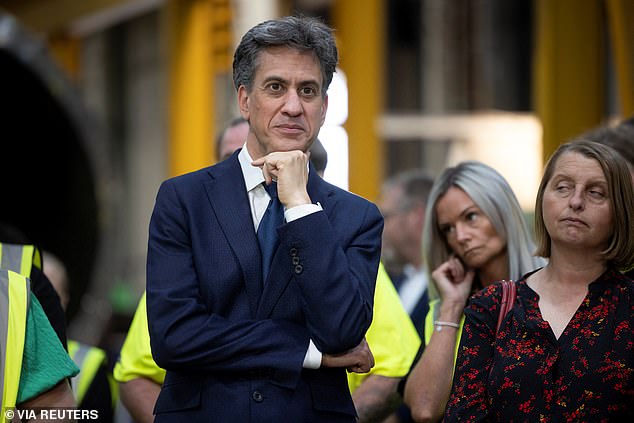
Ed Miliband smirks during speeches on visit to Cheshire yesterday
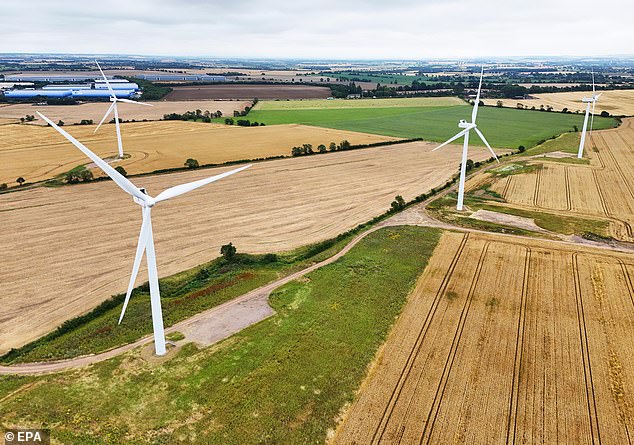
A drone image shows wind turbines at a wind farm in Biggleswade
Rolls-Royce believes it can capture a £250bn global market if it gets the go-ahead from Whitehall to build in the UK. The Czech Republic has already expressed interest in buying it.
Tens of thousands of real jobs will be created (not the makeshift jobs envisaged by the new Government).
So far, however, Miliband has been slow to give the green light.
We can all pray for the success of Great British Energy and the zero-carbon nirvana envisioned by our mission-driven Government.
But I fear we are creating a taxpayer-funded white elephant that will decimate our energy security.
Some links in this article may be affiliate links. If you click on them we may earn a small commission. This helps us fund This Is Money and keep it free to use. We do not write articles to promote products. We do not allow any commercial relationships to affect our editorial independence.


